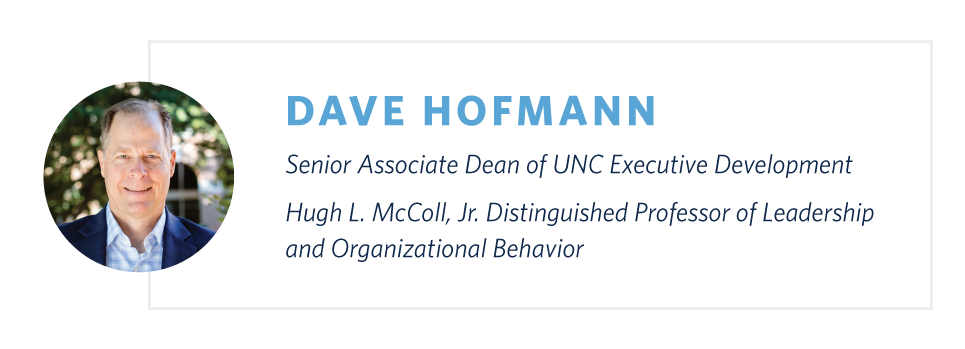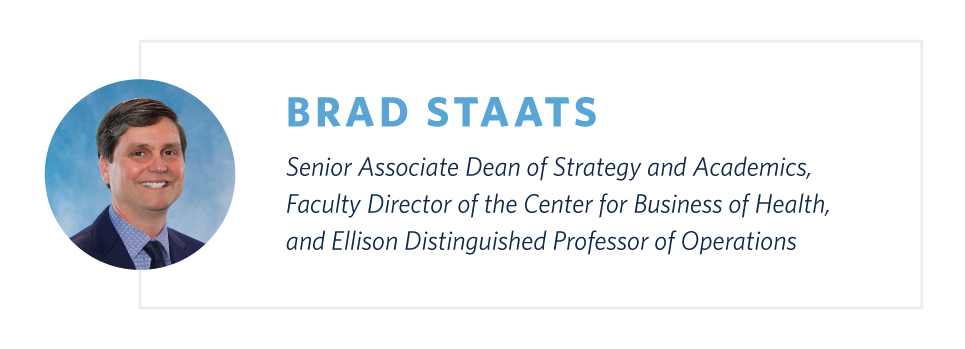Thought Leadership
Uncovering the Costs of Workplace Fatigue: Safety, Ethics, and the Bottom Line

Insights from UNC faculty on how leaders can uphold professional standards in their organizations by tackling fatigue.
Ethical, safety, and other professional standards are critical for keeping employees healthy, products and services reliable, and public trust high. However, we are all fallible. This is especially true when we feel the pressures of fatigue. It is therefore critical for leaders to consider the potential costs (both financial and otherwise) to their organizations when fatigue impacts professional standards in the workplace.
The Hidden (and Not So Hidden) Costs of Fatigue
Anyone who has had a poor night’s sleep or worked overtime knows that fatigue can impair work performance. Considering this, a study co-authored by UNC Executive Development’s Dave Hofmann and UNC professor Brad Staats examines the costs to organizations when employees feel fatigued.

Dave and Brad explored the connection between fatigue and observance of professional standards by studying how often healthcare service workers washed their hands during a shift. They found that during the first hour of a 12-hour shift, employees complied with handwashing standards at a rate of about 43%. However, by the final hour of the shift, that rate had fallen to just 35%.
At first, an 8% drop may sound small. However, the authors point out that “the cost per patient with a healthcare-acquired infection is $20,549,” and when this finding is applied to all registered hospitals in the United States, this figure climbs to a staggering “$12.5 billion annually.” This study therefore shows that even a small slip in professional standards can have a big effect on an organization’s bottom line, not to mention public trust.
Beyond Healthcare: Implications for Other Organizations
How much is workplace fatigue costing organizations in sectors other than healthcare? Dave and Brad recommend that leaders in all industries remain vigilant as they consider this question. “[Our] study looked at compliance in a healthcare setting,” they explain, “but the ramifications apply to any setting where professional and safety standards are important.” They remind us, for example, that fatigue within a financial institution might impact professional standards designed to prevent insider trading. Similarly, a transportation company must contend with how fatigue may impact their drivers’ compliance with speed limits.
![Graphic showing the quote “…Workers must often pursue multiple and sometimes conflicting goals on the job while facing intense work demands, [which] can result in inconsistent compliance with professional standards” from the academic paper, "The Impact of Time at Work and Time Off From Work on Rule Compliance: The Case of Hand Hygiene in Health Care."](https://www.kenan-flagler.unc.edu/wp-content/uploads/2023/11/Quote_Impact-of-Time-at-Work_001.png)
Scientific Solutions
Given the hidden (and not-so-hidden) costs of workplace fatigue, what can leaders do to keep fatigue low and the observance of professional standards high? Dave and Brad’s research reveals three key findings that can provide guidance to organizational leaders.
1) “More time off between shifts…is associated with greater hand hygiene compliance on a caregiver’s subsequent shift.”
In light of this finding, leaders can prevent fatigue by giving employees as much time off between work shifts as possible. Policies that discourage calling or emailing employees outside of work hours might also help teams return to work refreshed.
2) “The longer a caregiver worked in the past week…the more his or her compliance improved from more time off between shifts.”
Employees who have worked the longest hours seem to benefit the most from breaks between shifts. Therefore, leaders might consider designing schedules to give these employees longer-than-average breaks. Similarly, organizations can encourage employees to use paid time off for any reason by rebranding “sick days” as “mental health days.”
3) “Workers must often pursue multiple and sometimes conflicting goals on the job while facing intense work demands, [which] can result in inconsistent compliance with professional standards.”
Dave advises that organizations intentionally create a work culture that expects, rewards, values, and supports the observance of professional standards at all levels and across all functions. Otherwise, teams may view these standards as optional rather than non-negotiable.
Strong Standards, Healthy Workplaces, Lower Costs
Professional standards are critical for protecting employee well-being and the general public. Therefore, leaders can set their organizations up for success by preventing fatigue in the workplace and its negative effects on the observance of these standards. Whether you work in the healthcare industry or beyond, you can fight fatigue through nuanced scheduling, flexible PTO, and alignment of organizational priorities. These research findings can help your organization protect not only employee well-being, but also safety, ethics, and the bottom line.

